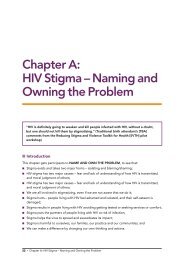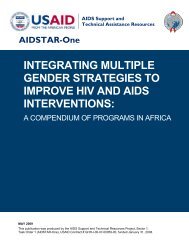Guide for Community Assessments on Women's Health Care - ICRW
Guide for Community Assessments on Women's Health Care - ICRW
Guide for Community Assessments on Women's Health Care - ICRW
You also want an ePaper? Increase the reach of your titles
YUMPU automatically turns print PDFs into web optimized ePapers that Google loves.
Medicine <str<strong>on</strong>g>for</str<strong>on</strong>g> Treating Opportunistic Infecti<strong>on</strong>s<br />
●●<br />
●●<br />
●●<br />
Fluc<strong>on</strong>azole is used to treat severe oral candidiasis or thrush infecti<strong>on</strong>s. Thrush causes painful<br />
little white sores in the mouth.<br />
Acyclovir is used to treat herpes, which are painful blisters <strong>on</strong> the lips or genitals.<br />
Cotrimoxazole is an antibiotic given to people living with HIV whose CD4 count is below 200.<br />
This medicine helps to prevent PCP (Pneumocystis Carinii Pneum<strong>on</strong>ia).<br />
Other Comm<strong>on</strong> Symptoms of AIDS and What to Do<br />
The most comm<strong>on</strong> symptoms of AIDS include: weight loss; fevers; breathing problems; digestive<br />
problems; and infecti<strong>on</strong>s of the mouth, skin, and genital areas. Some of these c<strong>on</strong>diti<strong>on</strong>s can be<br />
treated at home, with support from a health care provider.<br />
Nausea and vomiting. AIDS patients often feel nauseous. Patients should keep their mouths clean<br />
by frequently rinsing with clean water and using a toothbrush to brush the teeth and t<strong>on</strong>gue. Nausea<br />
can lead to vomiting, making them unable to eat. If the patient is vomiting, he/she should avoid fatty<br />
foods and not eat or drink fluids <str<strong>on</strong>g>for</str<strong>on</strong>g> <strong>on</strong>e or two hours, then gradually increase intake of fluids.<br />
Tiredness and weakness. People living with HIV often feel tired and should rest often. Help them do<br />
simple exercises, such as moving their arms and legs. If the patient is bedridden, encourage him/her<br />
to regularly move the arms and legs. Turn the patient every now and then. Keep him/her involved in<br />
daily home activities and help with daily needs, such as bathing and using the toilet.<br />
Sore mouth and throat. This is a comm<strong>on</strong> problem am<strong>on</strong>g people living with HIV.<br />
●●<br />
●●<br />
●●<br />
●●<br />
Rinse patient’s mouth with warm, clean water mixed with a pinch of salt.<br />
For white patches in the mouth, give the patient a lem<strong>on</strong> to suck (this sometimes may be too<br />
painful).<br />
Apply gentian violet soluti<strong>on</strong> to sores <strong>on</strong> the lips.<br />
Use soothing local remedies to help the patient relieve soreness.<br />
Pain. To help alleviate pain, give the patient two aspirin or paracetamol tablets every four hours.<br />
Make sure the patient does not have an empty stomach when taking aspirin or tablets.<br />
Swelling. Raise the legs or the swollen part of the body <strong>on</strong> pillows and massage the sore muscle<br />
using some oil or soothing cream. Regularly move the patient to change positi<strong>on</strong>s.<br />
Fever. Treatment <str<strong>on</strong>g>for</str<strong>on</strong>g> a fever can include:<br />
●●<br />
●●<br />
●●<br />
●●<br />
removing unnecessary clothing and blankets.<br />
wiping the patient down with a wet cloth, or using a cold compress.<br />
getting the patient to drink lots of water or other liquids.<br />
using aspirin or paracetamol (two tablets every eight hours).<br />
If the patient is too hot and the fever c<strong>on</strong>tinues <str<strong>on</strong>g>for</str<strong>on</strong>g> a l<strong>on</strong>g time or is accompanied by stiffness, severe<br />
pain, c<strong>on</strong>fusi<strong>on</strong>, yellow color in the eyes, sudden diarrhea or c<strong>on</strong>vulsi<strong>on</strong>s, seek medical assistance<br />
immediately. The fever may be caused by malaria.<br />
86 Annex A: Fact Sheets

















